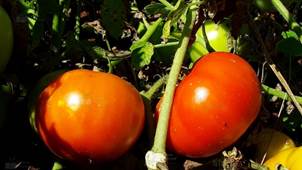Mi SciELO
Servicios Personalizados
Revista
Articulo
Indicadores
-
 Citado por SciELO
Citado por SciELO
Links relacionados
-
 Similares en
SciELO
Similares en
SciELO
Compartir
Cultivos Tropicales
versión impresa ISSN 0258-5936versión On-line ISSN 1819-4087
cultrop vol.42 no.4 supl.1 La Habana 2021 Epub 30-Dic-2021
Report of new cultivar
‘Mecha’, cultivar de tomate de mesa para condiciones tropicales
1Instituto Nacional de Ciencias Agrícolas (INCA), carretera San José-Tapaste, km 3½, Gaveta Postal 1, San José de las Lajas, Mayabeque, Cuba. CP 32 700
‘Mecha’ arose from the need for tomato varieties adapted to the Cuban tropical climate for open field planting. It is a variety that presents the Mi gene for resistance to nematodes and is tolerant to fungal diseases, such as Alternariosis. It has characteristics that allow it to be sown at the opening (seedbeds in August) and campaign closing (seedbeds in January).
Key words: Solanum lycopersicum; variedad; mejora genética; hibridación; selección
INTRODUCTION
Tomato (Solanum lycopersicum L.) production in Cuba, in an open field production system, requires varieties adapted to tropical climate conditions and resistant to the main disease affecting yields, the Tomato Yellow Leaf Curl Virus Begomovirus (TYLCV-IL [CU]. The availability by growers of Cuban varieties with these characteristics constitutes an advantage over imported varieties for extending planting and harvesting dates.
ORIGIN
The variety Mecha was obtained by crossing the commercial variety 'Amalia', tolerant to environmental stress and 'VFN-8', resistant to nematodes. From the F2 segregating generation derived from this cross, the "Single Seed Descent" selection method, modified to one fruit per plant, was applied. Backcrossing was carried out with Amalia cultivar to fix its agronomic characteristics. From the F2-F6 generation, the presence of the Mi gene was evaluated by isoenzymatic determination of acid phosphatases in polyacrylamide gels.
The resistant lines were evaluated for agronomic characteristics and yield at different sowing dates and times, at an experimental level, at Las Papas farm (INCA) and in organoponic conditions in the central area. The best lines were selected according to their agronomic performance and resistance during different planting dates.
DESCRIPTION
‘Mecha’ is a variety with a determinate growth habit (sp). It has large fruits, with an average mass of 130 grams, with multiple locules; it is light green in color and has no shoulders (Figure 1). The foliage covers fruits from the impact of the sun, as they develop in the central part of the plant. Ripe fruits have a uniform orange-red color, with a sweet taste to the palate, 4.5 ºBrix and 22.3 % acidity (measurements taken one day after harvest).
It is tolerant to early and late sowing conditions, with fruiting percentages close to 90 % and shows resistance to Alternariosis in the field (5-10 % of leaf area affected, compared to 40 % of the susceptible cultivar HC 3880). ‘Mecha’ can reach average yields of more than 40 t ha-1 at optimum sowing.
Received: December 15, 2020; Accepted: July 13, 2021











 texto en
texto en 




